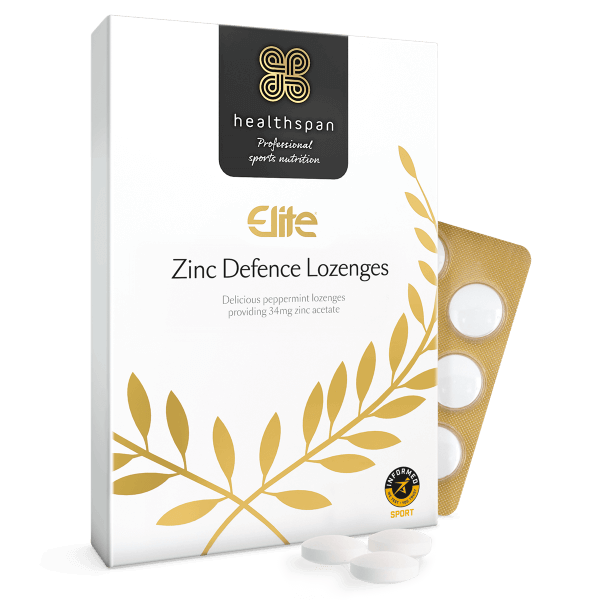Over 2,500 proteins in the body depend on zinc to work properly, which is why it's vital for so many aspects of health. Patsy Westcott explains what zinc does, what happens if you're deficient, and how to keep your levels topped up.
🕒 8 min read
What is zinc?
Zinc is a trace element needed in small amounts for health. The second-most abundant mineral in the body after iron, 50% of zinc is found in our muscles, 30% in our bones, and 20% in other tissues including the eyes, testicles, liver, brain, and blood.
Zinc is vital for everything from helping our body process the three big nutrients – carbohydrate, fat and protein – to helping cells communicate, aiding chemical reactions, supporting the structure of cells, encouraging a healthy gut and more.
As we can't store zinc in our bodies, we need a regular supply from food.
Why do we need zinc?
Immunity
Zinc helps produce and boost the action of immune system cells, helping to see off and shorten the duration of colds and other respiratory infections and speeding wound healing.
Deficiency is linked with… impaired immune response, skin problems such as eczema, increased susceptibility to colds and other infections and delayed wound healing.
Bones
Zinc aids bone growth and helps bones stay strong by balancing bone build-up and breakdown, and helps synthesise collagen, the protein that gives our bones structure. It works with vitamin D to help maintain healthy bones and muscles.
Deficiency is linked with… higher risk of fractures and development of osteopenia and osteoporosis. Zinc supplementation could help maintain bone density and improve healing should a fracture occur, according to a 2021 review. Supplementation has been found to increase vitamin D levels in post-menopausal women.

Zinc with Vitamin C
Easily absorbed zinc citrate for immunity, hair, nails, skin and vision
- Zinc citrate for easy absorption
- Supports immunity and multiple other health areas
- Support your health and wellbeing for 3p a day
Brain
The mineral helps orchestrate processes involved in the formation, maturation, and function of cells of the brain and nervous system, as well as helping brain cells communicate.
Deficiency is linked with… brain cell death, memory loss and problems learning. Fluctuations in zinc are thought to play a role in age-related cognitive decline, neurodegenerative diseases, and other age-related problems. However, balance is everything: after brain injury excess zinc can accumulate and damage brain cells.
Fertility
In men, zinc helps produce healthy, active sperm capable of fertilizing an egg, and helps combat damage from oxidative stress, such as from exposure to heavy metals and smoking.
In women, zinc helps produce high-quality eggs; it is responsible for 'the zinc spark'; a flash of light that happens at fertilisation. The brighter the spark the better the egg quality, and so the likelihood of it developing into a healthy embryo.
Deficiency is linked with… a significant role in 9% of couples having problems conceiving.

Nutritionist Rob Hobson outlines the particular health challenges facing men and the supplements that can help.
Find out more
Growth and development
The mineral is needed for foetal growth and development, as well as growth and development in childhood and adolescence.
Zinc helps support protein synthesis, which is vital for building and repairing tissues, and aids the cell division integral to growth.
Deficiency is linked with… poor growth and development, stunting, respiratory infections, diarrhoea and dermatitis. In children it is linked with poor memory, poor attention and impulsiveness, faddy eating, sadness and irritability. Changes in levels of zinc (and iron) have been suggested to aggravate and drive ADHD.
Skin, hair and nails
Helps keep the skin healthy, reducing inflammation, speeding up wound healing and helping promote cell repair and regeneration.
Deficiency is linked with… poor nail health, including brittle, ridged nails, as well as hair loss.
Protection against oxidative stress
Zinc helps protect against damage from harmful free radicals, helping to prevent inflammation and cell damage.
Deficiency is linked with… increased levels of inflammation and inflammageing in later life.
Metabolic health
Zinc helps our bodies process fat, glucose and insulin, avoiding spikes that over time can increase the risk of type 2 diabetes, heart and circulatory diseases. Researchers suggest 'understanding zinc's benefits could lead to better treatments for metabolic conditions, potentially preventing heart-related issues like stroke and angina.'
Deficiency is linked with… metabolic syndrome (a cluster of factors including high blood pressure, high levels of cholesterol and other blood fats, insulin resistance, fat around the middle, and high blood glucose.)
A 2020 study found that zinc supplementation for three months improved insulin resistance and oxidative stress status in overweight or obese people with non-alcoholic fatty liver disease.
Eye health
The mineral aids communication between cells in the eye and helps regulate how our eyes process light. It also interacts with vitamin A, which is needed for healthy vision. Zinc also supports the membranes of the eye's light-sensitive cells.
Deficiency is linked with… development and progression of certain chronic eye diseases, especially those affecting the retina. Supplementation may help slow progression of Age Related Macular Degeneration (AMD).

Zinc Defence Lozenges
Take at the first sign of cold and flu
- Throat lozenges with zinc to defend your immune health
- Coats the membranes of nose and throat when taken at the first sign of cold and flu
Causes of zinc deficiency
- Inadequate intake… not consuming enough zinc-containing foods (see below). Strict vegetarian or vegan diets.
- Zinc-blocking compounds in food… excess phytates, found in pulses, seeds, soya beans and products, and whole grains, or oxalates, found in spinach, okra, nuts, and tea.
- Poor absorption… due to ageing, chronic digestive diseases e.g. Crohn's and coeliac disease, diabetes, liver disease, sickle cell disease, kidney disease, excess alcohol consumption, short bowel syndrome caused by bowel surgery, and pancreatic problems.
- Medications… such as certain diuretics, antibiotics, and sodium valproate, can block zinc absorption.
- Excess alcohol… alcohol can block zinc absorption. People who abuse alcohol are at risk of zinc deficiency.
- Increased demand… zinc requirements double during pregnancy and lactation. Chronic illnesses can also raise the need for zinc to support healing, immunity and overall metabolism.
- Excessive losses… for example chronic diarrhoea, kidney disease or conditions where the body loses zinc through the skin or urine.
Sources of zinc
Eating a zinc-rich diet such as the Mediterranean diet can help ensure you get your zinc quota. Food sources of zinc include:
- Beef
- Shellfish (oysters contain more than any other food)
- Cheese
- Pulses (lentils, kidney beans)
- Nuts
- Seeds
- Sardines
- Quorn
- Tofu
How much zinc do we need?
In the UK the recommended amount of zinc per day for adults is 9.5 mg a day for men and 7 mg for women. The European Food Safety Authority cites the average daily requirement* (AR) for adults as 10.2 mg and the population reference intake (PRI)** as 12.7 mg.
*AR = the nutrient intake that meets the daily needs of half the people in a typical healthy population
**PR = the nutrient intake likely to meet the needs of almost all healthy people in a population
Could a supplement help?
If your diet falls short a supplement may help, especially if you fall into any of the following groups:
Women
A 2023 study of more than 250 women (pregnant and non-pregnant) based in Ireland revealed 58% to be at risk of inadequate zinc intake. It also suggested that 29% may be zinc-deficient.
This was due to a mixture of inadequate intake of zinc-rich foods and relatively higher intake of food items rich in zinc-blocking phytates (see above). The researchers conclude that low zinc intake may affect 87% of women, including 47% of pregnant women.
Vegans
Vegans are more likely to have an inadequate intake of zinc, according to a 2021 study. The researchers suggest that this could be the reason conditions such as depression, dermatitis, diarrhoea and hair loss are more common in vegans.
Older people
Poorer absorption, difficulty chewing, drug interactions and changes within our cells as we get older all increase the risk of zinc deficiency. This is thought to be a factor in inflammageing. A 2022 study of zinc supplementation in older people found that taking a supplement improved zinc status and boosted immune function in just six days.
Zinc deficiency often goes hand in hand with undernutrition, loss of muscle mass and strength (sarcopenia), and frailty as we age. The links between these are still being explored, according to a 2024 review, so watch this space.
The UK's ongoing survey of nutrition – the National Diet and Nutrition Survey – reveals that 8% of men and 4% of women aged 64-74 and 10% of men and 4% of women aged 75-plus have zinc intakes below the lower reference nutrient intake (LRNI)*.
*LRNI = the amount of a nutrient enough for the small number of people who have low requirements. Most of us need more than this level.
Safety matters
Too much zinc can cause nausea, diarrhoea and vomiting and other symptoms. How much is too much?
- The NHS and EFSA set the tolerable upper intake level or UL* at 25mg a day.
- US Food and Drug Administration (FDA) deems up to 40 mg per day as safe.
In the short term, such as when using zinc lozenges to treat a cold or sore throat, higher doses are acceptable. But stop if you experience side-effects such as nausea.
*UL = the maximum daily intake from all sources deemed likely to be safe and unlikely to cause harmful health effects.
Specifically, a previous study found that zinc lozenges shortened the duration of:
- runny nose (by 34%)
- nasal congestion (by 37%)
- sneezing (by 22%)
- scratchy throat (by 33%)
- sore throat (by 18%)
- hoarseness (by 43%)
- cough (by 46%)
- muscle aches (by 54%)
The researchers conclude that high-dose zinc lozenges, starting within 24 hours of symptom onset and continuing for less than two weeks, can be useful treatment for a cold.







